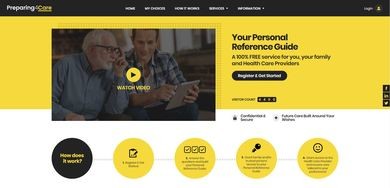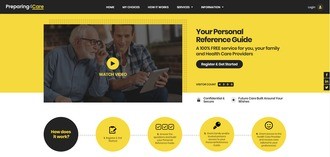
Why Complete a Personal Care Profile?
There are some topics that we just don’t like thinking about or talking about. Whether or not we need, or will need, care in the future, usually makes the list. It is not nice to think about developing a condition such as dementia as we age. The likelihood is as people live longer; we will all require some form of care in the future.
You may not have had any experience with care and therefore will not know what to expect. You might have had a family member or friend that has needed care. Whatever your experience of care, one thing that you will want to make sure of is that your needs and wishes are met if you require care personally. There is a large focus on what is known as person-centred care, as there should be, and our Personal Care Profile can help ensure your voice is always heard.

What is Person-Centred Care?
You may or may not have heard of the CQC (Care Quality Commission) but they are a regulator who was introduced with the Health and Social Care Act 2008. Regulation 9 of this Act is Person-Centred Care. It states that “the intention of this regulation is to make sure that people using a service have care or treatment that is personalised specifically for them”. This is further backed up by the NICE guidelines, Quality Statement 3: Advancement Care Planning, people with Dementia are given the opportunity to discuss advanced care planning at diagnosis at each Health and Social Review.
It doesn’t matter what type of care you may require, whether you are going into a Care Home or require Domiciliary Care for Home Care or who is offering you private health care for your needs and wishes, they all want to make sure that the care they provide is focused on you, the individual. This means ensuring that a person’s preferences, needs, and values are used to make decisions about the care they are receiving.
How is this done?
This can only be done well when care providers get to know an individual as a person and ensure their wishes and needs are factored into care-related decisions. Too often the creating of a care plan for an individual happens at a point where they actually require the care, this can mean they are coping with their condition, the anxiety and depression it can bring, and have limited abilities to make decisions. It is possible for family members and loved ones to get involved and help. A collaboration occurs where the individual, their family, and loved ones, occupational therapists, GP, and other healthcare professionals create a plan based on the needs of the individual.
What are the issues?
As we mentioned, the production of this care plan happens too late. If someone requires care and they are no longer able to communicate their needs and wishes, they might not be able to take part or will at least find it difficult to express their needs. The decision is then less about the individual’s preferences, needs, and values, but what others think those preferences are.
How do Personal Care Profiles Help?
At Preparing 4 CARE we saw that this was happening and that care plans were being created a little further down the line. We feel there is a huge benefit to having something in place before it gets to the stage where we require care. So, we created our 100% free service that can help bridge the gaps between the individual, family, and healthcare providers. By completing an individual Personal Care Profile, it creates a manual based on your preferences, likes, and dislikes, that is focused on what you want. Once you have finished a Personal Care Profile then you can grant access to family members or trusted persons. Then, if you ever need care, they can provide the healthcare provider with all of the information about your preferences. These plans can be updated by you, or those you grant access, to keep up with any changing preferences. All of the original answers will still be stored and these updates appear alongside them.
Don’t wait until it is too late, register and get started on your Personal Reference Guide today.
Comments